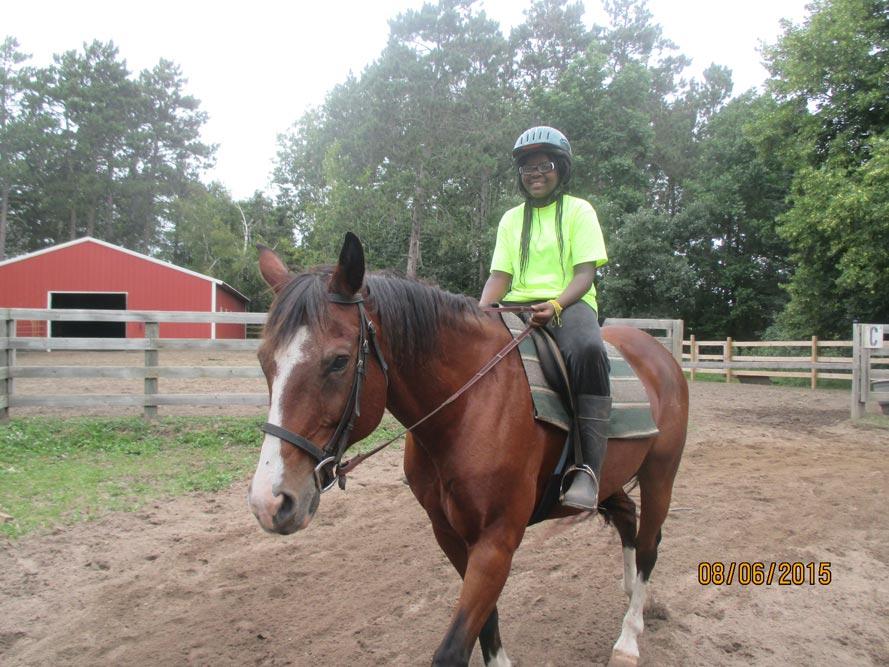Looking for the ideal horseback riding summer camp? You’re in the right place. With this guide, you’ll discover how to choose a camp that fits your riding skill level and personal goals, ensuring a summer packed with learning, fun, and developing meaningful connections with horses. Get ready for an inside look at the activities, lessons, and life-changing experiences these camps are known for.
Many camps (like Camp Kamaji) offer horseback riding as one of many programs, so while you’re geting to spend plenty of time with the horses, you’ll also get to experience activities you love and some you may not have considered before as a wide variety of summer camp programs are available.
Most campers enjoy the diveristy of programming at summer camps that offer horseback riding as part of their program instead of the entirety of their camp activities.
Key Takeaways
- Horseback riding camps cater to all skill levels, prioritize safety, and offer diverse styles from English to Western, ensuring an inclusive and memorable summer experience.
- Campers at horseback riding camps can expect thorough skill assessments, tailored riding programs, and comprehensive lessons that foster horsemanship, and care beyond riding.
- Equestrian camps provide holistic experiences that include bonding with horses through grooming and care, ample riding practice, and the backing of exceptional facilities and passionate staff.
Galloping Through Summer: The Joy of Horseback Riding Camps
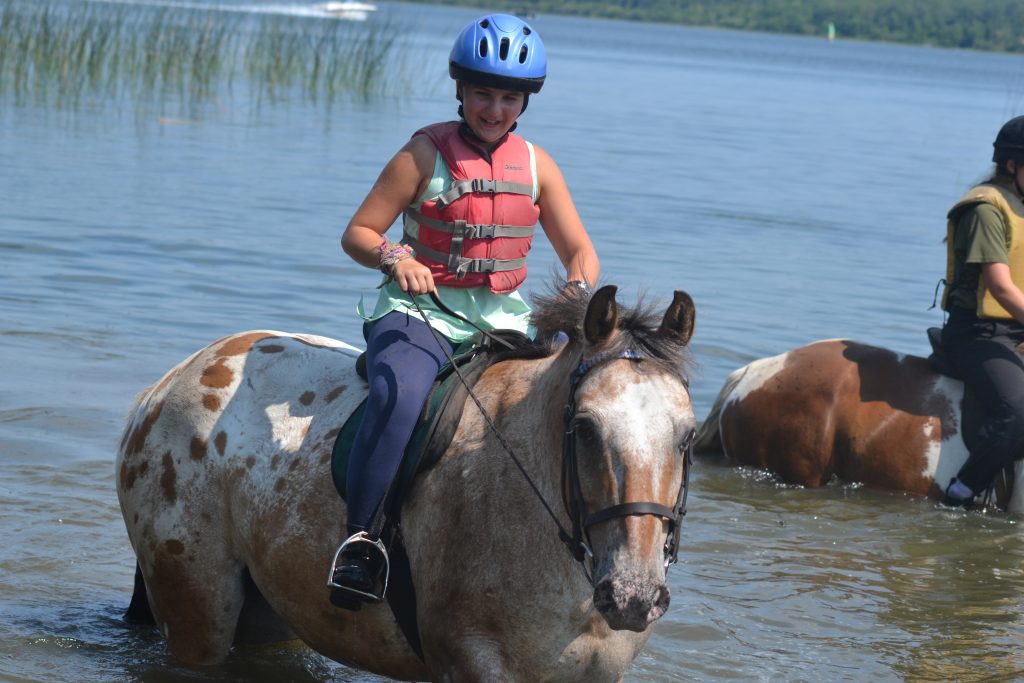
Horseback riding is one of our most popular activities at Kamaji
The prospect of embarking on a summer adventure at a horseback riding camp is certainly thrilling. A wide array of camps, each possessing its unique charm and program, awaits you.
One of the wonderful aspects of these camps is their inclusivity. They cater to a wide range of riders—from advanced equestrians with years of experience to young novices who have never ridden a horse before. The way these camps welcome everyone, irrespective of their riding skills, is indeed heartening.
Safety is a top priority at horseback riding camps, with important riding skills taught to prevent injury and essential safety equipment like helmets provided.
Finding Your Perfect Riding Camp
The journey of choosing the right horseback riding camp can itself be thrilling. Consider the riding style that interests you or your child. Different camps specialize in specific riding disciplines such as:
- English riding
- Western riding
- Dressage
- Trail rides
- Show jumping
- Cross-country
Choosing a camp that caters to the riding style you wish to learn or improve is an exciting process. Book a zoom call with Kat (our Kamaji Camp Director) here to find out about the horseback riding program at Kamaji.
Location is another vital factor. The location of a horseback riding camp determines the spectacular environment and beautiful surroundings where you or your child will be riding and interacting with horses. It’s not just about the scenery, though. The location can also affect the accessibility and convenience of the camp for participants.
Camp Kamaji’s lakefront location in Minnesota offers plenty of experience guiding horses through the woods, wading in the water, and at our on-site facilities with moderate Minnesota summer climates.
Lastly, factor in the skill level. It allows you to find a camp that offers programs suitable for your skill level, ensuring that riders ride at an appropriate level and have the opportunity to further develop their riding skills, whether they’re a beginner or an advanced rider.
What to Expect on the First Day
Filled with anticipation and excitement, the first day at a horseback riding camp is always memorable. Upon arrival, campers can expect:
- A ride check to assess their riding skills
- Placement into riding groups based on their skills
- Regular riding lessons
- Grooming activities
- Learning about horse safety
- Other fun activities
There’s a unique sense of camaraderie that starts to form from day one, as everyone shares in the joy of getting to know their horses and fellow campers.
Given the paramount importance of safety in horseback riding, all campers are taught safety procedures on their first day including:
- Approaching the horse cautiously
- Using safety stirrups and toe stoppers
- Wearing appropriate attire
- Learning emergency dismounts
- Checking the girth
- Leading the horse safely
Riding lessons are filled with opportunities to learn basic skills such as:
- mounting
- dismounting
- posture
- position
- basic control of the horse
Moreover, a comprehensive introduction to horse care and safety is provided to set a solid foundation for the camp experience.
Tailored Riding Programs for Every Equestrian
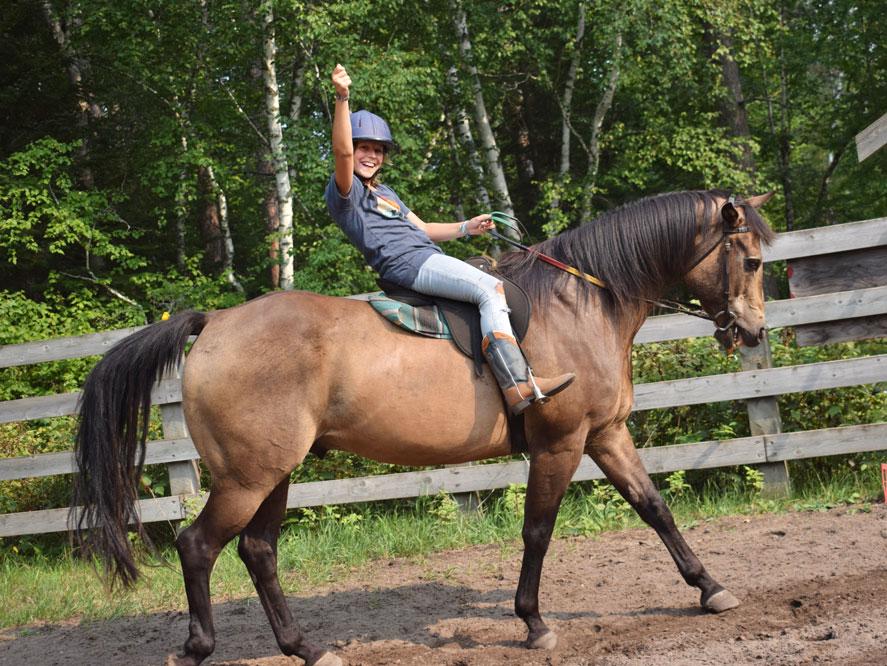
Build confidence and bonds with our Camp Kamaji horses and your fellow campers
Horseback riding camps offer a variety of riding programs, each designed to cater to a camper’s unique skill level and interests.
There’s a whole world of equestrian disciplines to explore and master at these camps.
All camps ensure each camper maximizes their equestrian journey, and assess a camper’s riding level through careful rider testing during the initial days of the session. This guarantees that each camper receives tailored instruction to match their unique skills.
Lessons in the Saddle: From Trot to Canter
At Camp Kamaji, riding lessons are thoughtfully structured to cater to different levels of riders. The riding group placement for campers is carefully determined by their current riding level, ensuring each camper is matched with a group that suits their existing skills perfectly.
Early evaluation of a camper’s skills plays a key role in ensuring that campers are matched with the most suitable riding group based on their physical size and fundamental riding skills, setting them up for a positive and enjoyable riding experience.
Beyond the Ring: Trail Rides and Horsemanship
Beyond the structured riding lessons, horseback riding camps offer a plethora of other equestrian activities. Trail rides, for instance, are a fantastic way for campers of all skill levels, from beginners to advanced, to experience the joy of communicating with and controlling their horses in diverse outdoor settings, like around the trails and lake at Camp Kamaji.
However, horseback riding extends beyond just riding horses; it involves building a profound understanding and respect for these majestic creatures. Horsemanship activities are an integral part of this process. They provide campers with valuable skills in caring for horses, such as:
- tacking
- feeding
- washing
- general care
This contributes to a comprehensive equestrian education through equestrian programs, especially for those with their own horse.
Life at Horseback Riding Camp
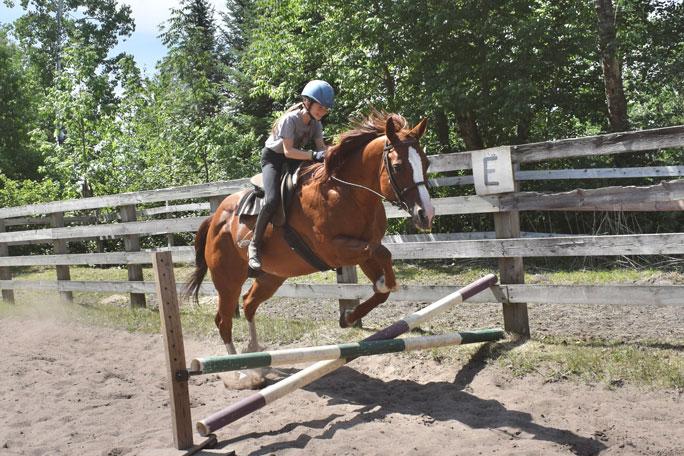
We cater our horseback riding summer camp experience to fit each experience level
Life at a horseback riding camp is a dynamic blend of fun, learning, and adventure. On a typical day, campers can look forward to ride checks, being grouped into lesson groups based on their riding skills, and a mix of engaging horse-related activities and lessons. It’s a full day of enjoyment, with the added thrill of being surrounded by nature and the companionship of equine friends.
A typical day starts with breakfast, followed by a ring lesson and horsemanship practice. After lunch, there’s free swim, village time/snack, a fun ride, and barn chores. The day ends with dinner, an evening activity, showers, and bedtime. The schedule, packed with horse-related activities and fun, provides a well-rounded experience.
A Week in the Boots of a Camper
A week in the life of a camper at a camp for horseback riding is a unique experience filled with learning, growth, and plenty of fun. With each day ushering in a new adventure, the mix of riding lessons, horse care, fun rides, and even barn chores keeps things interesting. Yes, chores!
Each camper gets to take part in tasks from feeding and grooming the horses, cleaning stables, mucking out stalls, to looking after the camp’s equipment. The experience extends beyond just riding; it involves nurturing a relationship with horses and comprehending their care needs.
At our horse camp, in addition to the thrilling riding lessons and horse care, campers can also enjoy a variety of fun activities such as:
- mounted games
- trail rides
- drill team exercises
- mock horse shows
- horse-related crafts
To round off the day, there are also non-equestrian activities like swimming, arts and crafts, and campfire nights, making their experience even more memorable and enjoyable.
Grooming, Tack, and Care: Engaging with Your Equine Partner
One of the most rewarding aspects of attending a horseback riding camp is the bond that forms between a camper and their horse. Part of this bond comes from taking care of the horse. Campers learn about grooming procedures, including:
- gently brushing the body
- using a curry comb to loosen dirt and hair
- brushing the face and legs with appropriate soft brushes
- combing the tail
These practices, while ensuring the horse’s cleanliness and health, also offer an excellent opportunity for riders to bond with their horses and identify any health issues at an early stage.
Equestrian camps heavily rely on tack, including:
- Saddles
- Bridles
- Girths
- Pads
These items enable riders to communicate effectively with the horse and maintain control during the ride. Tack also prioritizes the safety and comfort of both the horse and the rider.
Meanwhile, horsemanship activities offer campers the opportunity to learn the proper ways to work with their beloved equine friends, including understanding horse behavior, needs, and how to care for them. Such valuable skills contribute to building a rapport of respect and trust between the horse and rider, leading to a more robust and meaningful partnership.
Facilities and Staff: The Backbone of Quality Equestrian Camps
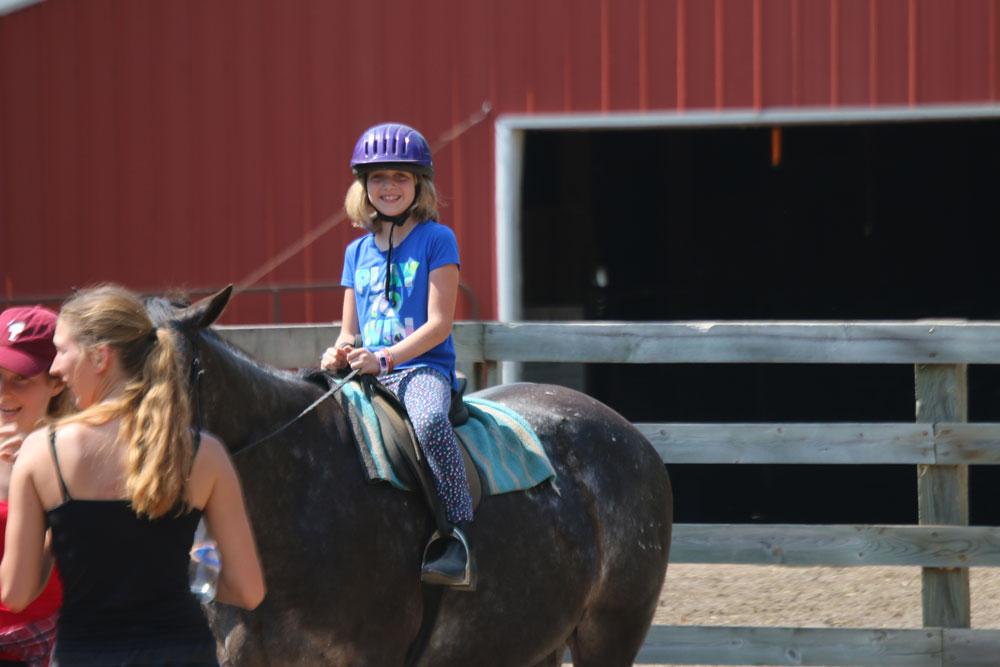
Campers are given the opportunity to learn and grow at their pace, coupled with experienced campers and counselors
In a quality equestrian camp, the role of top-notch facilities and experienced staff is pivotal. Camps offer state-of-the-art facilities, including:
- a modern barn
- outdoor rings
- a jump course
- numerous horse stalls
- large pasture areas
These facilities not only make the riding experience more enjoyable but also ensure the well-being and safety of the horses.
The equestrian staff, led by the equestrian director, are the heart and soul of these camps. They bring extensive equestrian experience, often being part of college teams or aspiring equestrian professionals. Their roles are multifaceted, including:
- overseeing rider safety
- ensuring appropriate training and equipment
- evaluating riders’ abilities
- pairing them with compatible horses
- overseeing all riding activities
Their commitment and passion for horses and riding make the camp experience truly rewarding for the campers.
Meet the Horses: Selecting a Good Fit
Matching a camper with the right horse is integral to their success and enjoyment at camp. Campers are thoughtfully matched with a horse or pony for their entire session based on size, ability, and personality. Each match is carefully considered to ensure the best fit between campers and their equine partners.
Matching a camper with the right horse is incredibly important as it leads to a positive and safe riding experience. It helps the camper feel at ease and confident, fosters a strong bond, and reduces the likelihood of accidents by aligning the horse’s behavior and abilities with the camper’s skill level.
Special Events and Activities: More Than Just Riding
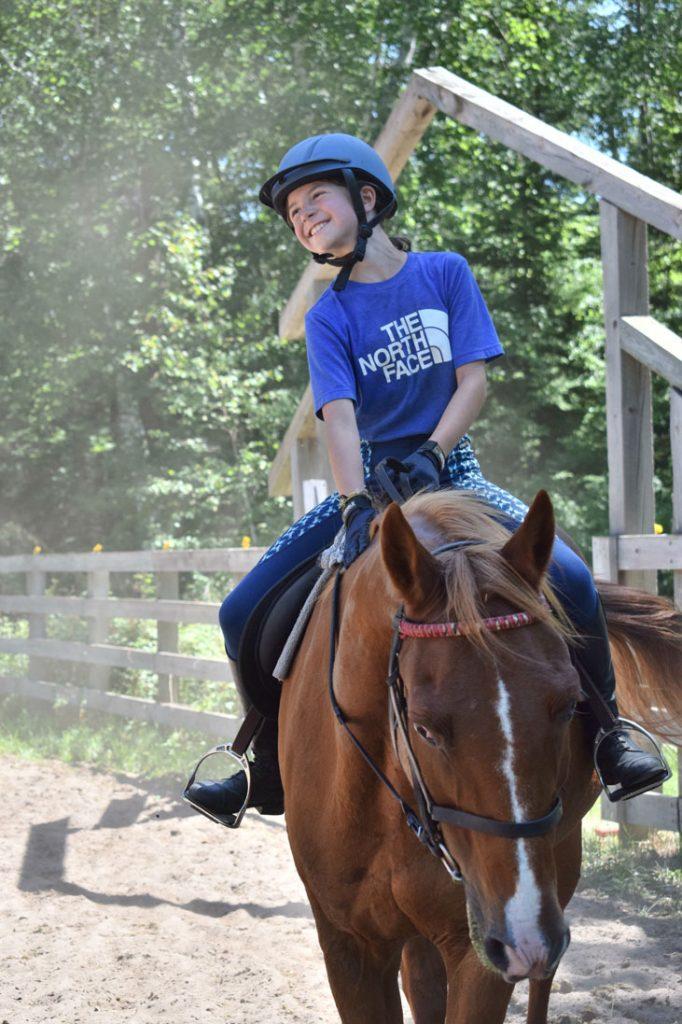
Young campers learn to bond and respect the power of their horse
While horseback riding is the central attraction of these camps, a variety of other activities and special events contribute to enriching the overall experience. Some camps host special Rodeo & Horse Show events, where campers can showcase their skills in a variety of equestrian disciplines and receive awards for their achievements. These events are a fantastic way for campers to demonstrate what they’ve learned and celebrate their progress with their peers and instructors.
Besides riding, a plethora of other activities await the campers. Some of these activities include:
- Mounted games
- Riding bareback
- Trail rides
- Drill team exercises
- Mock horse shows
- Beanbag balance
- Obstacle courses
- Relay games on horseback
- Horse-related crafts
These are just a few of the fun activities that campers can participate in during summer camp programs.
Evenings at camp bring their own set of entertainment, including:
- Campfires
- Talent shows
- Scavenger hunts
- Group games and activities to develop leadership, friendship, and independence.
These activities create a communal experience and help campers to unwind and relax after a day of summer camp activities.
Preparing for Camp: What You Need to Know
Thorough preparation is the key to a smooth and stress-free camp experience. Depending on the camp, campers should pack:
- A riding helmet
- Long pants like breeches or jodhpurs
- Riding boots
- Appropriate stable attire
- Grooming tools such as brushes, a hoof pick, and a mane brush
Having the right gear not only ensures safety and comfort but also helps campers to fully engage in all the camp activities.
Of course, our Kamaji Camping List includes everything you need to bring with you to camp!
The dedication of camps is towards providing a safe and healthy environment for campers. They have trained professionals who carefully supervise riders at all times, ensuring they only ride horses with known temperaments. Additionally, they conduct regular checks to keep all equipment in proper condition. Some camps even go above and beyond by providing all the necessary food and water, along with essentials for riders such as water bottle holders.
The Benefits of Horseback Riding Camps
Numerous benefits are offered by attending a horseback riding camp. On the physical front, horseback riding can:
- Lower blood pressure
- Improve circulation and flexibility
- Increase core strength
- Boost mood and reduce stress
- Provide a full-body workout
- Benefit cardiovascular health.
But the benefits of horseback riding camp go beyond just the physical. By attending a camp, children can develop important skills such as:
- Communication
- Teamwork
- Problem-solving
- Empathy
- Responsibility
- Leadership
It also provides opportunities for physical exercise and encourages the desire for continued growth and personal development.
The camp experience encompasses personal growth and self-discovery beyond just learning to ride a horse. Specialty riding camps are not the only camp experiences that can provide elite instruction. Camp Kamaji is a general sleepaway camp with an English riding program that caters to new riders and also those who take private lessons at home and can continue to work on jumping and riding bareback! Don’t forget to ask camp directors about their riding programs!
Learn more horseback riding at Camp Kamaji
Summary
To sum up, horseback riding camps offer a unique blend of learning, adventure, and camaraderie. From mastering riding skills and understanding horse care to experiencing the joy of trail rides and participating in special events, the camp experience is full of fun and personal growth.
Well-rounded sleepaway camps, such as Camp Kamaji in Minnesota with their top-notch facilities, experienced staff, and spectrum of programs, can also offer an enriching experience that extends well beyond just riding. So saddle up and get ready for an unforgettable summer of horseback riding!
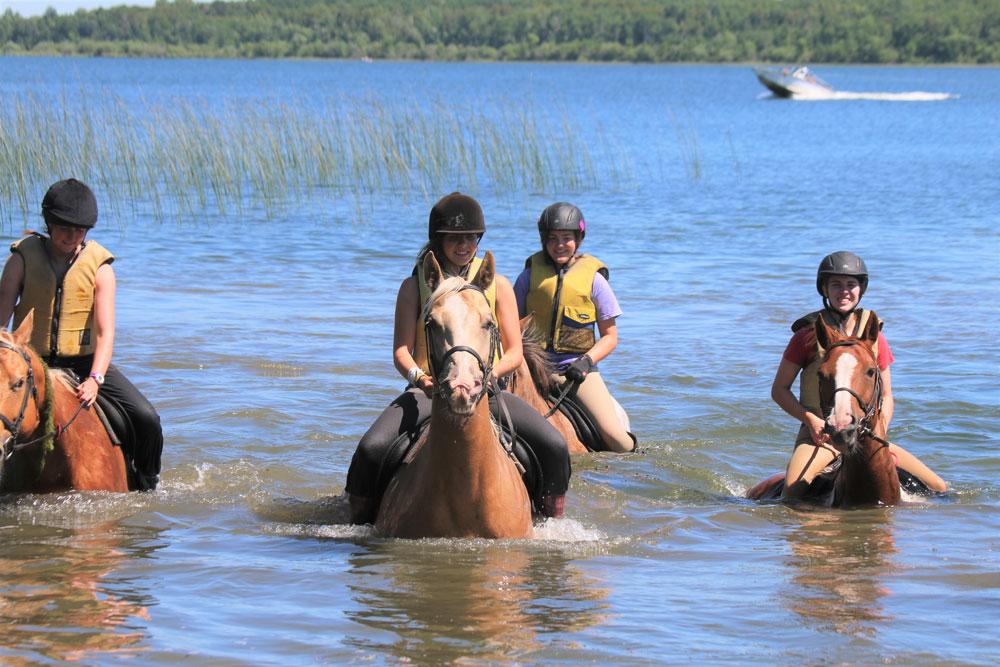
Minnesota summers are perfect for a quick swim with our horses
Frequently Asked Questions
What skills can children develop at a horseback riding camp?
At a horseback riding camp, children can develop a wide range of skills including communication, teamwork, problem-solving, empathy, responsibility, riding skills, and horse care practices. It’s a holistic learning experience that goes beyond just riding.
What activities can campers expect on the first day at a horseback riding camp?
Campers can expect a day filled with ride checks, riding lessons, grooming, and other fun activities on the first day at a horseback riding camp. It’s a great way to start the camp and get to know the horses!
How do horseback riding camps ensure the safety of their campers?
Horseback riding camps ensure the safety of their campers by teaching important riding skills, providing safety equipment like helmets, and matching campers with horses of known temperaments. By prioritizing safety measures, they create a secure environment for campers to enjoy their riding experience.
What types of horses can campers expect to ride at these camps?
Campers can expect to ride a range of horses, including experienced A circuit show horses and beginner horses, catering to various skill levels. You’ll have the opportunity to ride horses that match your skill level and experience.
What type of gear should campers bring to a horseback riding camp?
Campers should bring a riding helmet, long pants, riding boots, and grooming tools such as brushes and a hoof pick to a horseback riding camp. Proper gear ensures both safety and enjoyment during the camp experience.
Horseback riding is just one of the many specialized activities offered at Camp Kamaji.
Book a call with Kat (our co-owner, director, and Kamaji alumni) to ask about the horseback riding program at Camp Kamaji, and learn about the other activities you’ll get to enjoy this summer!
You might also like this article about 13 reasons why families love Camp Kamaji!
